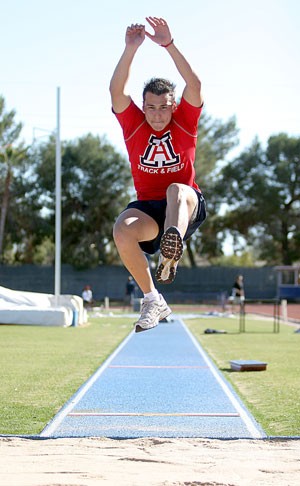The transition from high school to a university can be difficult. But the challenge increases even more when one transitions from a different country as well. This is the case with Luis Rivera, a long jumper for the UA men’s track and field team.
Having come to the United States only three years ago, the junior transfer has had to face tough times getting used to a brand new culture and overcoming the language barrier. But with a little help from some UA coaches and a couple years in Arizona, Rivera is proving to be successful both on the track and in the classroom.
Rivera began his track and field career at age 14 in Agua Prieta, Sonora, Mexico. Starting mainly as a runner, he made the transition to jumping at age 17. His high school didn’t have a track facility, however, and Rivera was forced to practice at the city park on dirt tracks and without a dirt pit for jumping.
The unfavorable facilities, as well as the lack of competition, led Rivera to consider the option of coming to compete in the U.S. So when he graduated from Centro de Bachillerato Tecnológico Industrial y de Servicios No. 81 three years ago, the first phone call he made was to UA track and field head coach Fred Harvey to let him know his interest in becoming a Wildcat.
Rivera had family in Tucson, loved traveling here for vacation and didn’t really give the decision much thought.
Harvey looked at Rivera’s high school stats, liked the promise he showed and offered him a chance. The only catch was that Rivera had to take the Test of English as a Foreign Language (TOEFL) to determine if he would be eligible to enroll at the UA.
Rivera unfortunately spoke very little English at age 17 and failed to meet the requirement to qualify him for a four-year university. He did, however, score high enough to get into a junior college. So he traveled a little further north and enrolled at Central Arizona College in Coolidge, Ariz., to earn his associate’s degree while improving his English.
“”(The most difficult thing) was that there were a lot of difficult cultures in one place and you don’t know how to approach people,”” Rivera said, in his first ever English interview. “”I took ESL (English as a Second Language) classes and had to watch TV in English and listen in English and try to communicate in English and that really helped me a lot.””
While at CAC, Rivera placed first in the long jump at the 2006 Junior College National Championship, and third in the triple jump. His hard work in the classroom helped him to pass the TOEFL on his second attempt. He called Harvey one more time to let him know and was offered a scholarship to bring him to the UA for the fall 2007 semester.
As far as finally competing for a Division I school, Rivera – now age 20 – said there is no better place he could be. In a world filled with doping scandals and accusations, he said there is less credibility for professional athletes whereas college athletes compete for their school and not for themselves.
“”Once I learned about the NCAA I was like, ‘I need to be there and I’ll do whatever it takes to be there.'””
Only three meets into his season at the UA,
Rivera already holds the nation’s third longest jump with a distance of 7.84 meters. He only recently began participating in the triple jump and finished fourth at the Tyson Invitational in Arkansas in the event with a jump of 15.35 meters.
Despite his early success, his coaches feel he has not reached his potential and will be a very important part of the team as the season goes on.
“”He’s not used to the shorter distance indoors and he’s not used to competing,”” said UA jumping coach Sheldon Blockburger. “”So I think he’s really going to peak and be a big help during the (outdoor season).””
As far as the dynamic that Rivera has brought to the team, his coaches have only the highest praise for him.
“”He makes practices more fun,”” Blockburger said. “”He’s always in a good mood and (is) a model student.””
Harvey added that Rivera’s addition to the team goes deeper than just his athletic skill.
“”The biggest thing, I think, is that the whole team is learning the cultural differences,”” Harvey said. “”Being able to learn and have tolerance for other cultures is a huge plus for everyone (on the team).””
Rivera, an industrial engineering major with a 3.3 grade point average, said that his post-college plans remain up in the air, although he’ll be the first to tell you that his main goal is to reach the Olympic Games. And even if that doesn’t work out, Rivera plans to still go out and train hard and do what he can to help his team in competition.
“”(Track) is the best part of the day for me,”” he said. “”You always have a lot of stuff on your head and you can just go out and run and forget everything for two or three hours.””
When all is said and done, however, Rivera hopes to get a job in his field of study straight out of college in the U.S. But if that plan falls through he hopes to return to Mexico and earn his master’s degree and work to help bolster the track programs in Sonora.
“”But no matter what happens, I have to thank the coaches here at Arizona for giving me this chance,”” Rivera said. “”They really helped me get through the rough times.””









